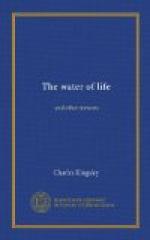The only undoubted picture, perhaps, of the next life to be found in the Old Testament, is that grand one in Isaiah xiv., where he paints to us the tyrant king of Babylon going down into hell:-
’Hell from beneath is moved for thee, to meet thee at thy coming; it stirreth up the dead for thee, even all the chief ones of the earth; it hath raised up from their thrones all the kings of the nations. All they shall speak and say unto thee, Art thou also become weak as we? art thou become like unto us? Thy pomp is brought down to the grave, and the noise of thy viols: the worm is spread under thee, and the worms cover thee. How art thou fallen from heaven, O Lucifer, son of the morning! how art thou cut down to the ground, which didst weaken the nations!’—Awful and grand enough: but quite different, you will observe, from the notions of hell which are common now-a-days; and much more like those which we read in the old Greek poets, and especially, in the Necyomanteia of the Odyssey.
When it was that the Jews gained any fuller notions about the next life, it is very difficult to say. Certainly not before they were carried away captive to Babylon. After that they began to mix much with the great nations of the East: with Greeks, Persians, and Indians; and from them, most probably, they learned to believe in a heaven after death to which good men would go, and a fiery hell to which bad men would go. At least, the heathen nations round them, and our forefathers likewise, believed in some sort of heaven and hell, hundreds of years before the coming of our blessed Lord.
The Jews had learned, also—at least the Pharisees—to believe in the resurrection of the dead. Martha speaks of it; and St. Paul, when he tells the Pharisees that, having been brought up a Pharisee, he was on their side against the Sadducees.—’I am a Pharisee,’ he says, ’the son of a Pharisee; for the hope of the resurrection of the dead I am called in question.’




